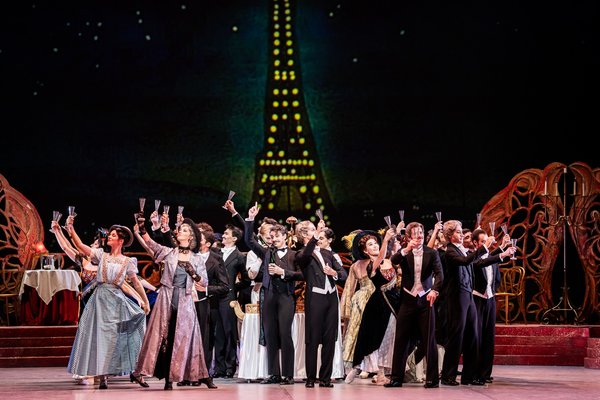
THE MERRY WIDOW
6 February 2025, 6 p.m.
In Brief
Comic ballet in three acts
Details
- Location
- Hungarian State Opera
- Date
- Feb. 6, 2025
- Start time
- 6 p.m.
- End time
- 8:40 p.m.
Synopsis
Act I
Scene One – The antechamber of the Pontevedrian embassy in Paris, 1905
The embassy is planning a ball in honour of the birthday of the Grand Duke of Pontevedro. The clerks Kromov and Prisics are anxious to finish their work as quickly as possible. The French attaché Camille de Rosillon is also ready to abandon his tasks. The ambassador's secretary, Njegus, arrives and instructs the three men to return to their desks, since they have work to do. When Njegus asks where he can find Count Danilo Danilovitch, the embassy's first secretary, they answer that he is out drinking. Shortly after the four have resumed working on their tasks, the secretary informs his colleagues that Pontevedro has gone bankrupt. Next to enter is the ambassador, Baron Mirko Zeta. In his hand is a telegram informing them that the wealthy Pontevedrian widow Hanna Glawari will be honouring them with her presence at the ball. The baron wants to convince Danilo to marry the widow so that her fortune will remain in the little Balkan state. The ambassador's wife, Valencienne, also joins the little company, and together they drink to the grand duke's health. Camille and Valencienne remain behind as the other depart. Valencienne starts to flirt with Camille. Even though she makes a show of her ring to remind him that she has a husband, this does little to impede their bantering. They don't even notice the sudden appearance of Njegus, who conceals himself behind a desk and only emerges when the two kiss. The lovers quickly separate, with Camille slinking off. Valencienne, however, asks Njegus to remain silent. Staggering in drunkenly, Danilo returns to the embassy from Maxim's. The ambassador tries to convince him to agree to the marriage, but finding that the designated groom is inebriated, he then asks Njegus to sober him up.
Scene Two – The embassy ball
The ambassador and his wife open the festivities. Afflicted with rheumatism, however, the baron is unable to dance with his wife for long. Camille asks him if he can substitute for him in dancing with Valencienne.Hanna Glawari arrives slightly late and is introduced to the embassy staff, including Count Danilovitch, by Baron Zeta. The ambassador has no clue that the widowed millionaire and Danilo have already met, and in fact were once even in love. Many years earlier, Danilo's family had been opposed to his marrying the then still-poor peasant girl. At the ball, Danilo tells Hanna that he still loves her, but the widow accuses of him of simply trying to get his hands on her money. The disappointed count wipes his forehead with the same kerchief that he once received from Hanna as a memento of their love. Hanna takes back the kerchief and leaves him there by himself. Danilo, on the other hand, reminisces about the days when he knew Hanna as a peasant girl.When Danilo returns to the ballroom, it's ladies' choice. Hanna selects Danilo, but in his disappointment the count rejects her rudely. Offended by this behaviour, Hanna instead dances with Camille, which makes Valencienne unhappy. Eventually, a partner switch brings Hanna and Danilo together on the dance floor. Even though the widow resists, she can no longer conceal her love for the count.
Act II – In the garden of Hanna Glawari's villa
A day later, Hanna is holding a ball in her villa in Paris. Dressed in Pontevedrian folk costumes, the guests resume saluting the grand duke with a great variety of dances. Peace is restored between Hanna and Danilo.Camille and Valencienne, however, are unable to restrain their emotions and, throwing caution to the wind, dance a duet before heading out to the garden pavilion. Njegus arrives just in time to get a glimpse of the two figures sneaking off and rushes to the keyhole to find out who is inside. Presently Mirko Zeta and Danilo also appear and notice the peeping secretary. In order to safeguard Valencienne's secret, Njegus swallows the key to the pavilion. As the other two men deliberate over how to open the door, Njegus asks Hanna, who happens to be strolling by, to rescue the situation. She agrees to help and steal into the pavilion through the back entrance, allowing her to open the door from the inside. Out struts Camille, followed shortly afterwards – to everyone's great surprise – by Hanna. To improve the joke even further, Hanna then reveals to the astonished group that Camille has asked for her hand in marriage. The ambassador is devastated to see his plan appear go up in smoke, and Valencienne swoons at her suitor's faithlessness. The grief-stricken Danilo, on the other hand, produces the kerchief he had received as a token of Hanna's love and then regained and thrusts it at Hanna's feet. Hanna, for her part, is delighted to see that Danilo is truly in love with her, and not her money.
Act III – Maxim's
At the nightspot, the maître d' welcomes the new arrivals. Entering on the heels of a procession of odd-looking characters are Baron Zeta, Valencienne and Njegus. The ambassador informs the company that bankruptcy is now inevitable for Pentevedro, prompting Njegus to lower the state flag. Hoping to lift the sombre mood, the maître d' brings champagne. Camille is received with contempt, but Danilo swiftly starts up the revelries, with grisettes providing the requisite high spirits throughout. Valencienne also joins in with the can-can.Now arriving, Hanna finds she has two men after her: Camille, maintaining the fiction out of obligation, and Danilo, out of love. Danilo is about to challenge Camille to a duel, but Hanna intervenes. When Valencienne comes to Camille's defence, however, the ambassador instantly realizes that it was his own wife who was in the pavilion with the attaché. Both couples dance. Somewhat despondent, Baron Zéta makes his peace with both his wife and her beau, and the three leave together. The disappointed Hanna stands in the middle of the room, but Danilo returns to her and clasps her in his arms. The couple's happiness is now unblemished, and Pontevedro is no longer in danger of going insolvent.
Gallery
Reviews
"Peter Docherty's set and costume designs create the fabulous and magical classic operetta milieu: glittering, elegant dresses, jewelry, and the permanent accessory of the ballroom – the huge staircase. Pomp and the bright, painted background of the Parisian night. All the romance you can get."
Emőke Sárosi, Táncművészet
